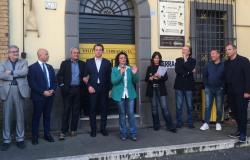There are books that fascinate, that can be read in one go, like a novel. That’s how it is”From red to black. The right turn of a working-class city” by Alessandro Portelli (Donzelli editore, page 269, 28 euros). And there are also books that, once read, dig inside you, ask you questions, ask for further information. So it is, again, “From red to black”. Because the story of the turning point, the story of the first non-northern city conquered by the League, built with a myriad of interviews, seems like live news and instead it becomes history.
Almost an Italian Stalingrad, Terni has always been proudly working-class and left-wing. There was no competition in the elections. The steelworks (Acciai speciali Terni, Ast) dominates the city, occupies it, attracts other companies. Big difference with other Umbrian cities, known for their beauty and history, in constant competition with the tiring and polluted “modernity” of Terni.
The company’s proposal, 80,000 euros to resign
In 2014 something broke. After a very long strike, over a month, with the support of the whole city, after the police attacks in Rome, with the managers and the CGIL secretary Landini injured in the head and several workers ended up in hospital, the management of the Ast factory an unprecedented proposal. 80,000 euros gross severance pay (60,000 net) to those who resign spontaneously.
In reality for Ast it is a clever zero-cost operation, the resources used are nothing more than the savings produced in the budget by those 35 days of strike. But for many workers it was the unexpected opening of a door, the possibility of dreaming of another life. Once the worker’s pride is over, the feeling of being avant-garde and with a role in the company and in life, here is a nest egg with which to reverse destiny.
The decline of an identity
So much so that many more workers responded than the company would have liked to send away. There was a queue in front of the offices where resignations were signed. But the agreement only concerned internal workers, not those of contracting companies, perhaps with temporary contracts. Who did the same job, but with fewer guarantees, less security and lower wages than direct employees, who were more easily fired, and who therefore increased in number in the factory together with accidents at work.
Forty years ago the question was whether to “free oneself from work or free oneself from work”. One of the possible answers was that of those who wanted to free work from profit, and that would already have been a good step forward. Here, however, the choice was to get rid of work,
It’s not just, as one worker says, “working to live” instead of “living to work.” That row of resignations tells of the decline of a dream, of an identity. The same identity crisis that grips Terni which has no other than that of a city of steel, blast furnaces and heavy industry.
There is certainly a bourgeoisie, but its cultural weight is laughable and separated from the world of work, which is sentimentally poor.
Those who have tried to change their lives, perhaps looking for Eden in Cuba, have often failed, the sirens of the market and success are elusive and deceptive. What has changed is political sentiment. Since there was no bank on the left, the workers and former workers turned to the right. The left just isn’t there, it doesn’t give presence or answers. The heavy protests in 2014 at the rally of Susanna Camusso, CGIL secretary, were a first warning.
“Why vote for the Democratic Party?”
Moreover, in the Manifesto of values of the Democratic Party “the word class occurs twice, always accompanied by the adjective leader; workers, factory, strike, union do not appear”, notes Alessandro Portelli. Renzi, says Massimiliano Catini, Fiom worker and manager, “took away Article 18, created the Jobs Act, liberalized layoffs. The question is: why should a worker vote for the Democratic Party?”. And Giulio Ratini, a contractor worker in Ast: “What displeases me and has certainly marked a political turning point of the working class towards the right is that it was a centre-left government that took away our rights”.
It’s not resentment, it’s not just protest. It is a lack of hope, it is confusion in the face of a Democratic Party of caciques and capos, so self-referential that it does not care about the people. First the protest vote for the Five Star Movement, then the boom of the League, finally the success of the Brothers of Italy. If today the mayor is the singular Stefano Bandecchi, a violent follower of Berlusconi but much more brusque and contradictory, it is only because Lega and Fdi have committed suicide by presenting themselves as separate and in competition with each other.
The seduction
The testimony of Anna Margaritelli, her socialist mayor grandfather, worker father, is impressive, she manages a petrol pump with a bar. Certainly the trauma of a nocturnal robbery. But it’s not enough, even if she admits: “I don’t have a faith. If I think something is wrong, I leave.” She likes Salvini, she shows up with the League; but then the clash with local leaders disillusioned her. Her meeting in her bar with Giorgia Meloni changes everything: her leader asks to go to the bathroom and then she has a coffee. “We started talking… I was talking to a person, to a woman. We talked like two women about the problems of the economy, work, etc…. And I liked him a lot because he was a person within my reach, a person who in any case approached me who didn’t know anyone… And then he said to me I’ll come and see you . She also gave me her phone number.”
I’m nobody, she made me feel like someone. And here is faith: “She is true, she is of the people. I can now say that I have great respect for this woman, and if I approach Fratelli d’Italia it is because I believe in her. I believe in her.”
A great political void
A testimony that shows a chilling political void. On this side two leaders who stoop to the people, on the other side nothing. A void that must be filled with meaning and values, if it is true that Terni is the “laboratory of Italy”. A responsibility that we all have, each in his place of life, in his field of commitment. Because there is something, there must be, at the cost of rebuilding it piece by piece. A common identity, a common future – perhaps not in the hands of Mayor Bandecchi who wants to knock out his opponents’ teeth and fuck any woman who comes within his reach – because one cannot think that work is residual, in the era of artificial intelligence. Other than residual, instead compressed into his rights. Classes, however changed, still exist, as do inequalities. A future that puts them aside is only useful to the ruling classes and, yes, also to the ruling classes.
Because there is something, there must be, at the cost of rebuilding it piece by piece. A common identity, a common future – perhaps not in the hands of Mayor Bandecchi who wants to knock out his opponents’ teeth and fuck any woman who comes within his reach – because one cannot think that work is residual, in the era of artificial intelligence. Other than residual, instead compressed into his rights. Classes, however changed, still exist, as do inequalities. A future that puts them aside is only useful to the ruling classes and, yes, also to the ruling classes.
Therefore, this book should be read, even by those who have never set foot in Terni. Because the questions he manages to raise are powerful. Where are the young people who, as in the rest of Italy, are by no means all depoliticized but certainly not listened to and beaten up? In the realities that still resist, that experiment, that study. In defense of the environment and quality of life. In the dream of a job that is identity and pride, not oppression and an iron fist, as the workers of Centurini, a textile mill in Terni, sang: “Morning and evening, ticking, until Saturday we have to start”. A different job is possible, a different politics is possible. It’s up to us to build it.









